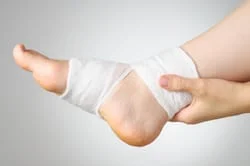Wound Care in Paoli & Philidelphia, PA
It’s estimated that over 29 million Americans have diagnosed or undiagnosed diabetes. When diabetes is untreated, it can cause wounds that don’t heal on their own. Diabetic wounds are a major concern for podiatrists because if they aren’t treated efficiently, there is a risk of major infection and possible amputation in very serious cases. It’s important to be informed about diabetic wounds if you are a patient who has this relatively common medical issue that affects nearly 10 percent of the population.
What Are Diabetic Wounds?
Diabetic wounds are abscesses or ulcers that develop in patients who have been diagnosed with diabetes. In non-diabetic patients, wounds normally heal on their own over time with proper at-home care, but a diabetic wound often becomes more and more infected over time and doesn’t heal. The problem is related to an issue called peripheral neuropathy, which affects the nerves in the body—most commonly the feet and legs. The blood vessels narrow and reduce the flow of healing oxygen and nutrients to the lower parts of the body.
What Causes Diabetic Wounds?
Diabetic wounds often occur in patients who have untreated or poorly managed diabetes. When a patient has a high blood glucose level for long periods of time, it affects both the immune and circulatory system. When there is a cut, bite or injury to the foot or leg, necessary nutrients can’t get to the wound to heal it. Your podiatrist must examine, clean and treat the wound with antibiotics to eliminate the infection. In some cases, surgery may be necessary to remove the bad tissue and allow for healing.
Preventing Diabetic Wounds
The first step to preventing diabetic wounds is getting your blood glucose levels under control with the assistance of your primary doctor. Take your prescribed medication and change your diet to reduce the consumption of sugary foods and carbohydrates. It’s also important to check your feet and toes frequently for injuries. Your podiatrist will show you how to carefully trim your toenails to avoid ingrown toenails and cuts. Wear dry thick socks at all times to protect your feet. If there is any sign of a problem, you must see your podiatrist for help to prevent a serious wound from developing.
Get Help at Your Podiatrist’s Office
Your foot health should always be a top priority—especially if you have been diagnosed with a medical condition like diabetes. Call Paoli and Center City FootCare Centers in Philidelphia, PA at (215) 545-0388 to schedule an appointment with a qualified podiatrist.
For More Information On Diabetic Wound Care In The Paoli & Philidelphia, PA Areas, Contact Paoli And Center City FootCare Centers By Calling (610) 647-0400 For Our Paoli Office Or (215) 545-0388 For Our Philidelphia Office today!


